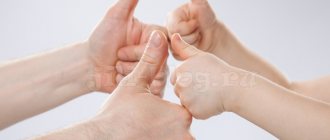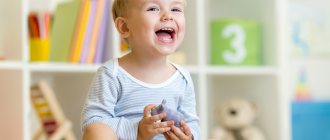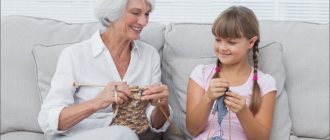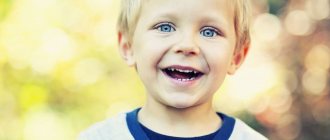What it is?
Neuropsychological correction (or, in short, neurocorrection) is a set of techniques that are used to overcome deviations and disorders in the development of mental functions in children aged 2 to 16 years. It is especially effective when working with children, who can be called:
- hyperactive, impulsive;
- excessively tired;
- awkward, sloppy, absent-minded;
- having difficulties in the areas of thinking, speech, spatial concepts, attention and memory;
- perform poorly at school due to problems with writing, reading, and arithmetic.
As is known, a child’s brain is formed throughout ontogenesis (his entire life). This process has its own order; it has a number of strictly defined stages. When these stages are disrupted for one reason or another (difficult childbirth, illness, developmental features, or adverse effects of the environment in which children grow up) are disrupted, the development of mental functions of the brain is also disrupted.
Some mental functions may be formed in a distorted form, or not formed at all. In such cases, the child is indicated for diagnosis and neurocorrection of mental functions and behavior.
Through a specially designed and selected set of motor and cognitive exercises, a neuropsychologist sequentially activates each zone of the child’s brain. These exercises - eye movements, joint movements of arms and legs, rocking, crawling - repeat the natural movements that a normally developing baby makes. When a child masters them, the structures of his brain finally begin to work in the sequence in which they should have been from the moment of birth.
In order for the method to bring results, all motor exercises must be performed carefully, in strict sequence and always in combination with cognitive exercises, individually and under the supervision of a specialist. Only then do they become the basis for the activation of higher mental functions - emotions, perception, attention, memory, thinking, self-regulation processes, etc.
Through control of his body and his movements, as well as through mastering cognitive functions, the child gets the opportunity to overcome maladaptive features of his development, difficulties in school learning, difficulties in self-regulation and childhood behavioral problems.
Causes of speech underdevelopment
Speech underdevelopment refers to a polyetiological defect, which can be either an independent pathology or as a consequence of more complex defects, including alalia, dysarthria, rhinolalia, etc.
Figure 1. Structure of a speech defect. Author24 - online exchange of student work
A pure speech defect includes unformed sound pronunciation and phonemic perception, a limited vocabulary and imperfect grammatical structure of the language.
The reasons for general speech underdevelopment may be:
- lack of correct conditions for the formation of a child’s speech in the family - lack of communication, deaf parents, a foreign nanny who does not speak Russian well;
- speech underdevelopment of children raised in orphanages;
- the use of different languages in the family and in preschool;
- unfavorable social conditions.
The reasons for general speech underdevelopment are biological and social in nature.
Among the biological factors may be maternal intoxication during pregnancy, group incompatibility of the blood of mother and fetus, pathology of the natal period, brain injuries in the first years of the child’s life, etc. A persistent variant of general speech underdevelopment is underdevelopment due to early organic damage to the brain, moreover, this is the most difficult defeat.
Note 2
Thus, the causes of speech disorders are quite complex and diverse. Typical manifestations of general speech underdevelopment are observed with alalia and dysarthria. With rhinolalia and stuttering, manifestations of speech underdevelopment are less common.
Figure 2. Levels of speech underdevelopment in children. Author24 - online exchange of student work
Method components
Neuropsychological diagnostics and behavior correction in childhood are conventionally divided into two inextricably linked components:
- Motor correction;
- Cognitive or educational correction.
The first component, already described above, serves to stimulate the regulation of movements, improve interhemispheric interaction and the development of children’s spatial representations.
The second component, cognitive correction, is aimed at developing cognitive skills and overcoming the child’s learning difficulties.
To create stable and positive motivation in a child, neurocorrection classes are conducted in a playful way.
The course of motor correction includes at least 25 lessons. One lesson lasts from 40 to 60 minutes, depending on age. Make an appointment Addresses and telephone numbers of branches in Moscow Ask a question Reviews
Do traumas affect behavior and emotions?
Practice shows that a person’s character and style of behavior directly depends on his emotional and affective aspects. It is on them that the desires, feelings, needs of the body, etc. depend. If a patient receives a brain injury, he may develop pathologies of behavioral regulation and problems with controlling his actions. The person may become impulsive, aggressive and irritable, and may lose interest in work or life.
Some patients develop a general indifference to everything that previously interested them (hobbies, work, family), they may refuse to eat or take hygiene procedures. Some people experience depression and may not be able to control their emotions. Infantilism often develops, that is, the patient’s activities and interests do not coincide with his age). There is also general disinhibition. For example, they may become overly talkative but still lack control over their words and expressions. Often such people do not comply with the rules of subordination, cannot monitor interpersonal relationships and maintain distances where necessary.
Methods and methods of treatment
Neuropsychological rehabilitation involves the use of classical and innovative methods of clinical psychology. At the same time, they are adjusted to the specific patient, taking into account his characteristics, level of development and severity of injury.
Additionally, various therapeutic procedures are used, which are based on basic neuropsychological methods, based on the fact that problems of the central nervous system should not prevent a person from living and developing fully. Using them, you can return the patient to social life.
For example, if a patient’s memory has deteriorated as a result of an injury, the specialist makes appropriate correction and helps improve it. If treatment does not produce results, the doctor recommends that the person use compensation mechanisms, in particular a diary or diary. If all important events and tasks are recorded in them, the patient will be able to live a full life.
Correctly carried out neuropsychological correction will lead to the fact that the intact parts of the brain will help the patient restore cognitive abilities in one way or another. They can take over the functions of damaged parts, replenish them or compensate for loss. But for this to become a reality, you need to contact only competent specialists. They will be able to recognize pathologies, create an individual rehabilitation program and implement it in such a way as to provide real help.
Additional goals
If we talk about what goals, in addition to the main ones, neuropsychology has, we can highlight:
- The ability to detect serious psychoneurological diseases in the early stages of their development. We are talking about diseases such as Alzheimer's, dementia, etc. Accordingly, the specialist will be able to develop appropriate rehabilitation or stimulation programs to curb the disease.
- Determining the level of brain injury and the appearance of cognitive impairment. Such studies are carried out in situations where the patient has suffered as a result of the actions or inactions of others. Based on the research, claims can be drawn up in order to obtain fair compensation for damage to health. These studies are often practiced in the legal field.
- Studying the patient and his cognitive abilities to determine whether there is damage to brain activity. Such studies are carried out in order to find out exactly when the disorders arose and whether they exist, or whether the patient exaggerates their presence or simply feigns them.
- Making a differential diagnosis. Neuropsychology allows us to understand whether the symptoms observed in a patient are acquired as a result of brain injury, or whether they developed earlier due to a psychological condition. Often diseases develop earlier, and trauma intensifies them and makes them visible.
Please note: Both the patient and family benefit from these studies and interventions. They are also necessary for third parties who are participants in the events preceding the injury.
Features of the study
Let's look at the process of neuropsychological examination and subsequent correction. First, the specialist assesses the patient’s condition and conducts a detailed diagnosis. It helps to understand exactly what disorders are present, why they arose, what consequences may occur in the future, whether treatment is possible, and what the general prognosis is from the actions taken.
After collecting anamnesis and diagnostics, the neuropsychologist develops an individual program taking into account the patient’s characteristics. It includes various rehabilitation activities for therapeutic purposes. After the program is completed, the specialist evaluates the result and draws appropriate conclusions. He focuses on what goals have been achieved, what the patient’s status is, whether correction needs to be continued, etc.
In order to understand what exactly happened to a person and whether he needs help, a neuropsychologist uses several different methods. He talks with the patient, his loved ones and family, obtains the necessary information from medical records and records, conducts a variety of tests, and also observes the victim in various situations. At the same time, he should not provoke him, but simply observe and draw conclusions.
Should you involve your family?
If a person has been injured and has problems with higher nervous activity, then the process of correction and correction is developed individually by a speech therapist and a neuropsychologist. Usually tests are carried out first, and then various exercises that help normalize the process.
Involving family and friends shows good results. Patients recover faster and the rehabilitation period lasts less. Therefore, be sure to consult with a specialist - it is quite possible that he will offer you participation in group classes to increase productivity and efficiency.
Attention: neuropsychology implies an integrated approach to the recovery process. Therefore, in addition to family therapy, you may need physical exercises and exercises that strengthen the connection between the hemispheres of the brain.
Note that the family can work with the patient at home. To do this, you need to get specialist advice and strictly follow it. This advanced approach will help you recover faster.









